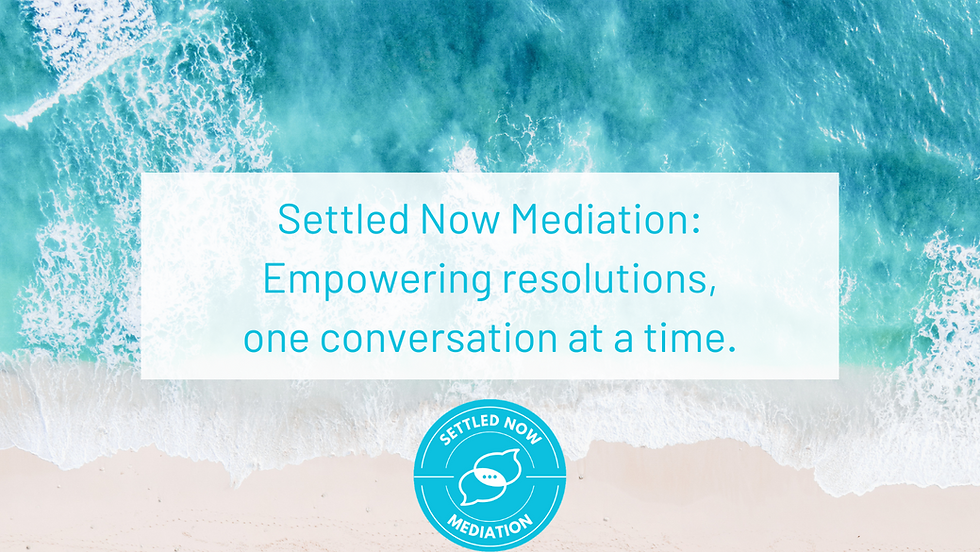How Mediation Helps Emotional Healing After Separation: Support for Closure and Resolution
- Settled Now Mediation
- Sep 13, 2024
- 4 min read

At Settled Now Mediation, we understand that separation is one of the most emotionally challenging experiences a person can endure. Our mediation services support emotional healing and closure, offering a safe, neutral environment for families to navigate the turmoil of separation. Whether you are seeking a 60I certificate or a healthier way to resolve conflict, mediation can help foster healing and provide lasting solutions.
Separation is one of the most emotionally challenging experiences a person can endure. It marks the end of a significant relationship and often involves a myriad of emotions such as grief, anger, fear, and sadness. In Australia, mediation has emerged as a valuable tool in navigating the emotional turmoil of a separation, providing support for healing and closure. This article explores the emotional impact of separation and how mediation can play a crucial role in facilitating a healthier transition.
Understanding the Emotional Impact of a Separation
Separations affect individuals on multiple levels:
- Grief and Loss: Separations can feel like a bereavement, with individuals mourning the loss of their relationship, shared dreams, and future plans.
- Stress and Anxiety: The uncertainty surrounding future living arrangements, financial stability, and co-parenting responsibilities can cause significant stress and anxiety.
- Anger and Resentment: Feelings of betrayal, injustice, or unmet expectations can lead to anger and resentment towards the former partner.
- Guilt and Shame: Many individuals experience guilt over the failure of the relationship/marriage or the impact on their children, coupled with societal stigma.
These emotions can complicate the separation process, making it difficult to reach amicable resolutions and move forward.
How Mediation Supports Emotional Healing
Mediation offers a structured yet flexible approach to addressing the practical aspects of a separation while also supporting emotional healing:
1. Creating a Safe Space
Mediation provides a safe, neutral environment where both parties can express their feelings and concerns. This setting encourages open communication, allowing individuals to articulate their emotions without fear of judgment or confrontation. Feeling heard and understood can be a crucial step in the healing process.
2. Reducing Conflict
By its nature, mediation is less adversarial than litigation. The process focuses on collaboration and finding mutually acceptable solutions rather than winning or losing. This reduction in conflict helps to lower emotional stress and fosters a more positive atmosphere for resolving issues.
3. Empowering Participants
Mediation empowers individuals to take an active role in shaping their future. This sense of control and participation can alleviate feelings of helplessness and boost self-esteem. Knowing that they have a say in the outcome can be incredibly empowering and contribute to emotional resilience.
4. Addressing Emotional Needs
Mediators are trained to recognise and address the emotional aspects of separation. They can provide support by acknowledging the participants' feelings, facilitating constructive dialogue, and helping to manage emotional responses. This emotional support is integral to moving past the pain and towards acceptance.
5. Promoting Healthy Communication
Effective communication is essential for resolving conflicts and maintaining post- separation relationships, especially when children are involved. Mediation helps individuals develop better communication skills, fostering respectful and productive interactions. Improved communication can reduce misunderstandings and ongoing disputes, promoting a healthier co-parenting dynamic.
6. Focusing on the Future
While acknowledging past grievances, mediation encourages individuals to focus on future solutions. This forward-looking approach helps participants to let go of the past and concentrate on building a new life. Setting goals and making plans for the future can provide a sense of direction and purpose, aiding emotional recovery.
7. Providing Closure
Reaching an agreement through mediation can provide a sense of closure, allowing individuals to finalise their Separation and move on. Knowing that they have resolved their issues amicably can bring peace of mind and emotional relief. This closure is essential for healing and beginning the next chapter of life with confidence.
8. Supporting Children’s Well-Being
Separation is particularly hard on children, who can be caught in the crossfire of parental conflict. Mediation prioritises the best interests of the children, encouraging parents to collaborate on parenting plans that provide stability and continuity. When parents work together amicably, it reduces the emotional impact on children and promotes a healthier family dynamic.
Conclusion
Separation is undoubtedly a challenging emotional journey, but mediation offers a pathway to healing and closure. By providing a supportive and constructive environment, mediation helps individuals navigate their emotions, reduce conflict, and find mutually acceptable solutions. This approach not only addresses the practical aspects of a separation but also supports emotional well-being, empowering individuals to move forward with confidence and resilience.
At Settled Now Mediation, we are dedicated to helping families find amicable and lasting resolutions. Our experienced mediators are here to guide you through every step of the process, ensuring a swift and effective outcome. If you need a Section 60I certificate fast or are looking for cost-effective and compassionate mediation services in South East Queensland, contact us today. Call us at 1800 262 241 or Click to Email.
Settled Now Mediation: Empowering resolutions, one conversation at a time.


